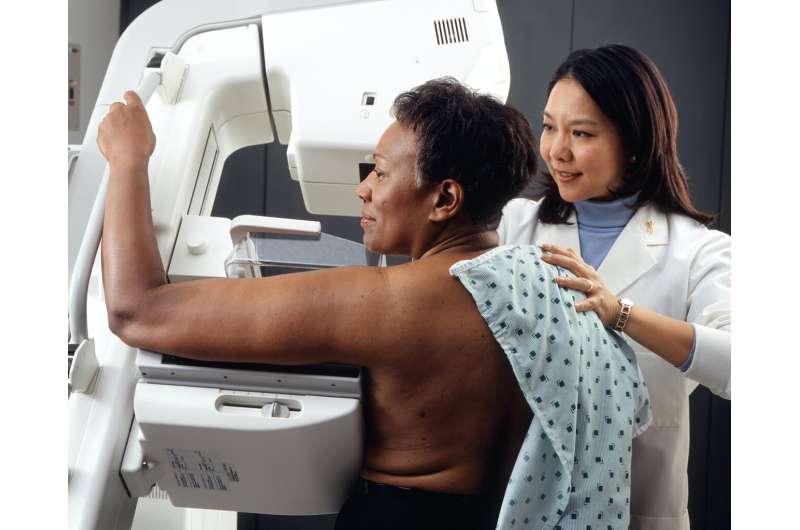This article has been reviewed according to Science X's editorial process and policies. Editors have highlighted the following attributes while ensuring the content's credibility:
fact-checked
trusted source
proofread
Tumor biology may underlie racial differences in certain breast cancer outcomes

Regardless of socioeconomic factors and tumor variables, Black women with triple negative breast cancer have a significantly poorer response to chemotherapy than white women, researchers at Duke Cancer Institute report.
The finding, published online Feb. 23 in the Journal of Clinical Oncology, suggests that this type of aggressive cancer may not be the same tumor in all patients, contributing to differences in treatment outcomes for racial and ethnic groups.
"While socioeconomic factors are associated with adverse cancer outcomes and contribute to racial disparities, our research suggests that triple negative breast cancer (TNBC) tumors appear to respond differently to chemotherapy in women of different races and ethnicities and this may also contribute to the disparities," said senior author Maggie DiNome, M.D., chief of the Section of Breast Surgery in the Department of Surgery at Duke University School of Medicine and member of the Duke Cancer institute.
"Our findings support the need for further research into understanding the molecular and biologic differences of TNBC based on race and ethnicity that affect response to treatment," DiNome said.
DiNome and colleagues used data from the National Cancer Database, analyzing outcomes of more than 40,000 patients with TNBC who were treated with chemotherapy followed by surgery. TNBC is the most aggressive subtype of breast cancer with the lowest overall survival. It is characterized by the absence of estrogen or progesterone receptors, along with too little or no HER2 protein, which are three drivers of other cancer types.
Historically, Black women develop TNBC at higher rates and have worse survival outcomes than white women.
Chemotherapy is a front-line treatment and can be lifesaving. Overall, the researchers found that chemotherapy completely eradicated TNBC tumors in 29.8% of cases, but there were racial/ethnic differences in that response rate:
- 27% for Black women
- 28.8% for Asian women
- 30.5% for white women
- 32.6% for Hispanic women
"Interestingly, our study found that Hispanic women, who have similar socioeconomics and tumor stage as Black women, have higher rates of response to chemotherapy, which further supports our hypothesis that biological differences may exist within TNBC based on race/ethnicity," DiNome said.
DiNome noted that studies for approving TNBC chemotherapies had been conducted in patient populations that were overwhelmingly white.
"Further research into understanding the biologic differences that affect response to treatment is necessary to identify more effective treatment options for patients with this aggressive breast cancer subtype and address the racial disparities in the outcomes," DiNome said.
More information: Hannah E. Woriax et al, Racial/Ethnic Disparities in Pathologic Complete Response and Overall Survival in Patients With Triple-Negative Breast Cancer Treated With Neoadjuvant Chemotherapy, Journal of Clinical Oncology (2024). DOI: 10.1200/JCO.23.01199




















